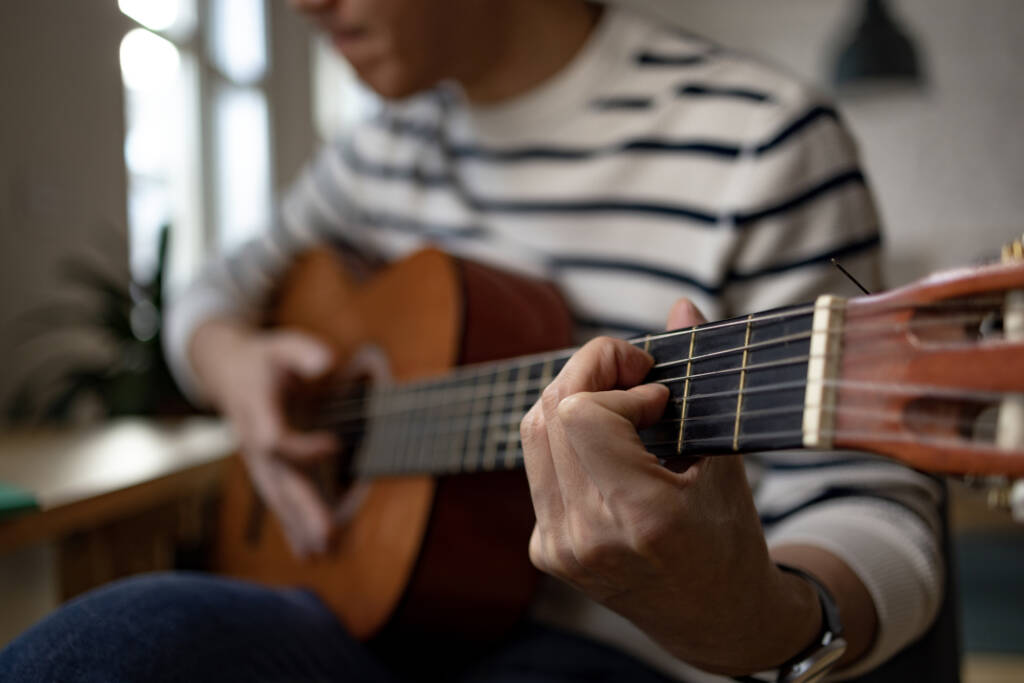
Guitar 2

Are you ready to take your guitar playing to the next level? Whether you want to play guitar for your family and friends, desire to be a professional performer, or just love playing music, this course is a great place to continue your journey towards musical excellence. You will build on the fundamentals of music and the basic skills necessary to play a wide variety of music styles. Student guides, Carlos and Ariel, will guide you through each step of this journey towards becoming a skilled guitarist and musician. This course can be used as a performing/fine arts credit to meet the requirements for certain high school graduation tracks.
During this course, you will learn career-related skills and earn a badge for this accomplishment. A badge is a digital certification of your career-related learning that you can share on social media or with higher education platforms, colleges, potential employers, peers, and colleagues. Select this link to learn more about badges.
Major Topics and Concepts
Guitar and Music Essentials
Rock and Blues Legends
Expanding Your Chord Skills
Expanding Your Accompaniment Skills
Movable Major and Minor Scales
Building Chords up the Fretboard
Guitar Ensembles: Trios
Music of the World
Course Materials
You will need a playable six-string guitar and a way to record and submit a
video performance to your instructor.
A guitar is “playable” if it is the correct size for the guitarist, is easy to press
the strings down against the frets, and plays in tune up and down the
fretboard. There are three common types of six-string guitars: classical,
steel string, and electric. If you do not already have a guitar, you may want
to seek the advice of an experienced guitarist, a guitar teacher, or your local
music store.
Most guitars are built to be played right-handed, so that the right hand
would pluck the strings and the left hand would press the strings down
against the frets. Many left-handed guitarists play right-handed guitars.
Many guitarists and teachers recommend that left-handed students try
playing on a right-handed guitar when first learning. There are some guitars
available that are built to be played left-handed. This course is taught using
a right-handed guitar. Students choosing to use a left-handed guitar will
need to adjust accordingly.
Competencies
Guitar Music Basics
Students will demonstrate an understanding of guitar music basics by explaining guitar tablature and fretboard diagrams and reading standard notation while playing the guitar.
Making Movable Music
Students will demonstrate an understanding of movable music by playing movable chord progressions, movable pentatonic and blues scales and explaining the intervals, enharmonic notes, and natural intervals that they play.
Chord Skills
Students will demonstrate an understanding of chords by identifying and playing major and minor chords as accompaniment in songs.
Playing Riffs
Students will demonstrate an understanding of strum patterns by Identifying riffs of famous guitarists and playing chords, strum and fingerstyle riffs.
Movable Major and MInor Scales
Students will demonstrate an understanding of major and minor scales by reading and playing major and minor scales patterns and composing melodies using a movable scale pattern in multiple keys using a movable scale pattern.
Triad Inversions
Students will demonstrate an understanding of triad inversions by building and playing 4 note chords and inversions, 7th note inversions, and partial barre and barre chords.
Chords and Inversions to the Twelfth Fret
Students will demonstrate an understanding of chords and inversions by building and strumming chords and inversions up to the twelfth fret and playing a piece of music using chords and inversions up to the twelfth fret.
String Instruments
Students will demonstrate an understanding of instrument families by describing the characteristics of instruments in the string family and explaining their pitch ranges.
